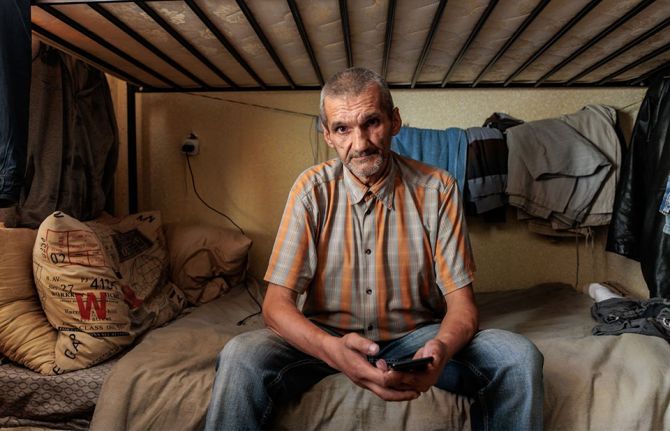
Feature Story
One woman’s fight against AIDS in Ukraine
13 March 2007
13 March 2007 13 March 2007
Tatiana Semikop’s story begins in 1994 when she was working as a criminal police officer in Odesa. That was the year Tatiana met an 11-year-old boy living with HIV who did not know who or where to turn to for help and support. At the time Tatiana knew very little about AIDS but wanted to help the boy, so she set out to learn more and to find out how he could get support. However, the more Tatiana looked, the more she realized there was little available.
“I was shocked,” said Tatiana. “I couldn’t believe that no-one in the oblast or even the city could give me the information I was looking for, no-one seemed to know anything, it was as if the disease didn’t exist,” she added.
Finding out more
During her efforts to find out more about AIDS, Tatiana heard about a workshop being organized by UNAIDS to provide on HIV prevention for law enforcement groups. Through this workshop she gained vital knowledge on the complex issues related to AIDS in Ukraine and the different kinds of interventions needed in the country to help stem the spread of the disease.
Ukraine is facing the most severe AIDS epidemic in Europe. At the end of 2005, nearly 400,000 people were living with HIV in Ukraine and adult HIV prevalence was estimated at over 1.4%. Ukraine’s epidemic is primarily concentrated among people considered to be most ‘at-risk’—and 60% of the people living with HIV inject drugs.
“Using non-sterile injecting equipment is the major driver of the AIDS epidemic in Ukraine,” said Anna Shakarishvili, UNAIDS Country Coordinator in Ukraine. “More than 45% of new HIV infections reported in the first half of 2006 were in people who inject drugs. But sexual transmission of the infection from drug users is also rapidly increasing and the number of children born to HIV positive mothers continues to rise,” she added.

Unprecedented approach
Through her police work, Tatiana encountered injecting drug users on a regular basis and to her it made sense to start focusing her HIV prevention work here. With her help, Ukraine’s first projects to reduce harm from injecting drug use were initiated and implemented.
A unique feature of the programmes was the cooperation with the law enforcement groups and an agreement by Odesa’s Mayor to say these activities could take place—a groundbreaking move for the country at that time.
“We couldn’t believe that we had really dared to take such an unprecedented and unique approach to tackling the epidemic,” said one of the seven members of the small team who started the pilot project. “This had never been done before in Ukraine,” she added.
From these modest beginnings, today there are programmes focusing on injecting drug users and HIV across Ukraine which have become commonly recognized and respected HIV prevention tools.
Twelve years later
Twelve years since first encountering the issue of AIDS, Tatiana Semikop has moved up to the ranks of police lieutenant-colonel, is an author of a scientific dissertation on the psychological characteristics of police work relating to AIDS, and is the Chairwoman of one of the most efficient non-governmental HIV-service organizations in Ukraine – Vera, Nadezhda, Lubov (“Faith, Hope and Love”). In March this year Tatiana Semikop received her second ‘Woman of the Year’ award from law enforcement groups in Odesa for her continued commitment and dedication to the AIDS response.
Inspired by their mother’s example, Tatiana’s children have followed in her footsteps. Her 16-year old daughter Nina, gives lectures on AIDS at her secondary school, participates in various projects and writes articles on AIDS for a city newspaper. Her 24 year-old son Evgeny has already become a coordinator of one of the HIV-service projects in Odesa.
Vera, Nadezhda, Lubov
Tatiana’s organization Vera, Nadezhda, Lubov provides a variety of services across Odesa and neighbouring districts –-including a special mobile voluntary counselling and testing outlet that tests female sex workers for HIV and sexually transmitted infections at the site of their work; and helps women who have suffered domestic violence.

The organization has more than 100 members and provides information services and training on AIDS and other related issues at educational institutions around the city and in the rural areas. Vera, Nadezhda, Lubov also publishes a newspaper for people who inject drugs, sex workers and people living with HIV.
Tatiana is particularly proud of the creation of a community centre for people living with HIV and people most at risk of HIV infection. “We organise nature trips, holidays and we have special visiting photo exhibitions, a self help group and a social club,” she said.
Working on AIDS issues has become a source of inspiration for Tatiana and her colleagues. Many of the organization’s employees have personal experiences of drug addiction and came to know about the organization when seeking support. Now, having received training and professional experience, they have become indispensable employees, committed to helping others going through similar life situations.
“The explanation for our success is very simple,” said Tatiana. “We believe in what we are doing, and we see the fruit of our efforts every day.”
Links:
Read more on Ukraine
Read more on the European AIDS Conference: Responsibility and Partnership – Together against HIV/AIDS



